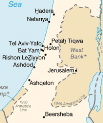DAMASCUS, Syria -- On Monday, top Hamas leader Moussa Abu Marzouk announced from Damascus that Hamas supports Mohammad Shabir as the new prime minister of Palestine, a candidate also supported by Palestinian President Mahmoud Abbas of Fatah. This brings an end to the political deadlock that has crippled Palestinian life since Hamas came to power in January 2006. The outgoing Prime Minister Ismail Haniyya, age 43, came to power with big dreams and promises for Palestinians. Among these were improving the livelihood of average citizens, combating corruption, and punishing those responsible for misuse of public office under Fatah, which reigned in Palestine from the signing of the Oslo Peace Accords in 1993 until it was defeated and ousted by Hamas in 2006. Young, charismatic, and highly popular, Haniyya at first inspired confidence in the Palestinian government. He continued to live in his modest home in Gaza and refrained from accepting any lavish bonuses or privileges, endearing himself to Palestinians at a grassroots level. He also sent emotions soaring in the Arab street, which overwhelmingly is committed to resistance against Israel. Haniyya achieved none of the objectives he set out to achieve, however, and instead used his post to promulgate revolutionary rhetoric about the Palestinian resistance. Apart from providing jobs to members of Hamas, and gratification to pro-Hamas Arabs, Haniyya's era resulted in a crippled Palestinian economy with a $700 million deficit, a continued embargo on Palestinian aid, an ongoing Israeli onslaught and a mini-civil war between Fatah and Hamas. In addition, a total of 34 senior members of Hamas, including deputies, ministers, and the speaker of parliament, Aziz Duwayk, were arrested by Israel in response to the Hamas government's taking power.
Pragmatism Key for New Palestinian Prime Minister Shabir

